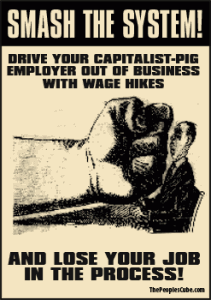AB 350: The Hire Lousy Workers Act
The assault on California businesses has been going full throttle in the current legislative session. It’s conducted by union-backed Democratic legislators oblivious to the state’s 11.8 percent unemployment rate and ranking as one of the the worst states in the country in which to do business. The California Chamber of Commerce lists 30 job-killing bills that have been introduced, 18 of which remain active, including AB 350.
Dubbed the “Displaced Property Service Employee Opportunity Act,” AB 350 forces companies that provide building security, maintenance, window cleaning or food services to retain the employees of the previous service contractor for 90 days and then offer those employees continued employment unless their performance is unsatisfactory.
For example, a building owner notices that supplies are disappearing and suspects that security guards are sleeping on the job and may be complicit in the thefts. As a result, he fires the security firm and hires a new one. Under AB 350, all of the same security guards must remain on the job for at least three months — and perhaps much longer — unless the new firm can prove that they aren’t doing the job.
Sponsor Assemblyman Jose Solorio, D-Anaheim, introduced the bill in the Assembly on May 31. He noted that it’s an expansion of the Displaced Janitor Opportunity Act, which has been in effect for 10 years and requires building maintenance contractors to retain the previous contractor’s employees for 60 days.
Solorio said the legislation “has been working fairly smoothly for both employers and employees” and added that AB 350 “will provide security to workers to maintain and secure buildings and provide flexibility for employers throughout California. These type of employees can lose their job with little or no warning. California continues to have very high unemployment levels.”
Opposing Views
Two Republicans spoke in opposition.
Kevin Jeffries, of Lake Elsinore, argued that AB 350 makes it unfair for service companies when bidding on a contract. “How do you know what to bid?” asked Jeffries. “Because if you’re the successor bidder, and you didn’t plan to absorb all of the employees who were working in that building, you have just bankrupted your own business by winning the contract. You have to guesstimate what the cost would be of all of those employees. So that will put your bid over the top and probably cause you to lose the bid. So it’s a no-win scenario if you’re trying to have competition at the best prices.”
Shannon Grove of Bakersfield said, “So this legislative body is now going to legislate and tell private businesses who they can hire, who they can fire and to retain employees who they no longer wish to retain. It’s amazing to me. We are again attacking businesses. If you bid on a contract and have your own employees and are awarded that contract, why wouldn’t you want to use your own employees? And then to [be forced to] let those employees go to hire other employees that aren’t even a part of your company? I can’t believe this legislative body is going to dictate to employers and small businesses who they can hire and fire.”
AB 350 passed easily 46-31 with only four Democrats voting against it along with all of the Republicans. It’s scheduled for the Senate Appropriations Committee on Aug. 15.
The real intent of the bill, which is backed by a variety of unions, may be to strengthen the unions’ power in the building services industry. Federal law requires that when a company hires and retains unionized employees for 90 days, the company must then open union contract negotiations, according to a Los Angeles Business Journal article, citing an employment law specialist.
Forced unionization is one of the arguments against the bill cited in the legislative analysis:
“[O]pponents contend that this bill is designed to ensure that a union, who has been elected as the bargaining representative through the proper procedures for the prior contractor, will remain the bargaining representative for the subsequent employer. According to opponents, since this bill mandates that subsequent employers hire the predecessor’s employees, it would provide automatic protection to the incumbent union to maintain its status as the bargaining representative, thus forcing all contractors/employers of ‘property services’ to be union employers. Opponents believe the decision of whether or not to have a union in the workplace should be left to the employers and employees, after following the proper procedures outlined by the National Labor Relations Act.”
Protected Class
The anti-unionization argument is not used by the ad hoc No On AB 350 coalition, however. A sample letter the coalition provides for supporters to send to legislators argues that AB 350 “violates the fundamental relationships governing contracting services and the most basic tenets of employer hiring review.” And it “creates a protected class of building services employees” who must be retained “even if those employees were directly responsible for the previous contractor losing the job.
“AB 350 takes away the fundamental right and responsibility for an employer to screen its new hires for things such as competency in the skills required for the job. Finally, this bill would add to the already uncompetitive regulatory environment we have in California, making it more difficult for employers to expand their businesses, hire more employees, and contribute to the economic vitality of the state.”
If the bill makes it through the Appropriations Committee, it’s likely to sail through the state Senate on a party-line vote. The question is whether Gov. Jerry Brown will sign it. Although he’s usually as union-friendly as most Democrats, Brown has also shown an independent streak. He vetoed a card check bill that threatened to end secret balloting in farm worker unionization elections. And he scuttled another bill that had the effect of giving public employee unions control over the commissions that govern public employees.
He might decide that another bill goosing unemployment isn’t needed right now in the Golden State.
Related Articles
Experts missed December CA drenching
Bringing cheer and presents, on Christmas Santa Claus is going to fly over a California a lot greener than was
Greenlining series: Another ACORN-like menace?
This is the fourth part of a series produced by CalWatchdog and the Examiner regarding the Berkeley-based Greenlining Institute, a
L.A. mayor Eric Garcetti announces he won’t run for California governor
Los Angeles mayor Eric Garcetti announced on Sunday night that he will not enter the California governor’s race, posting on Twitter that





